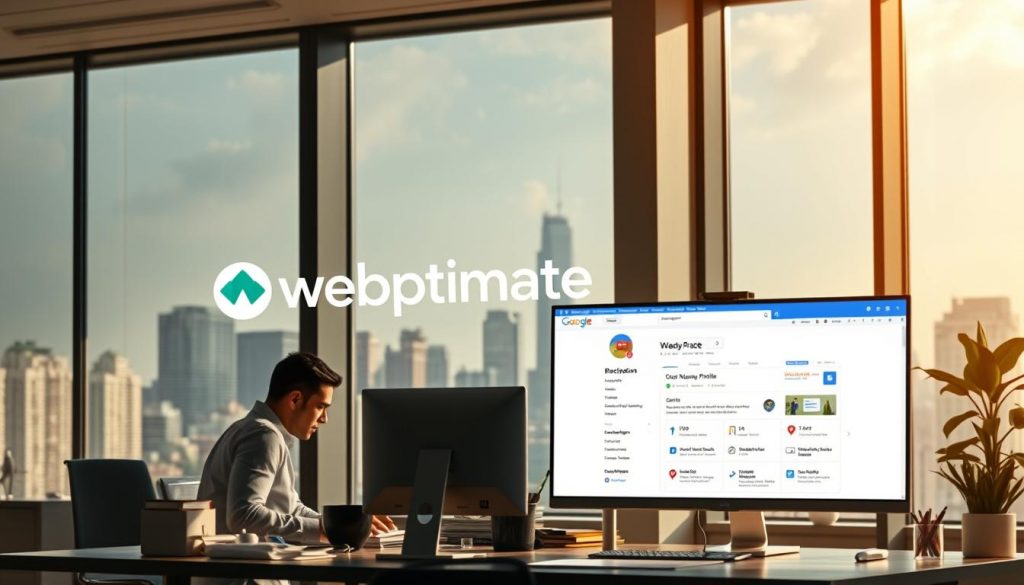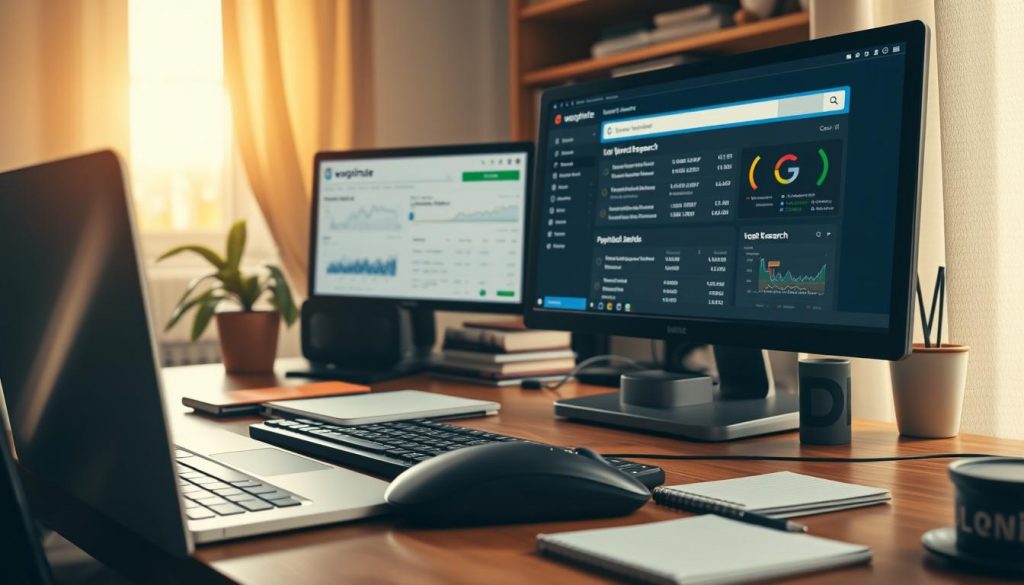Are you a small business owner curious about the role of local SEO in growth? The truth is, optimizing for local search can significantly boost your business’s visibility and revenue. In today’s digital world, a strong online presence is key to drawing in local customers.
We will dive into how effective local SEO strategies can transform your business’s online footprint. This will help you connect with your target audience more effectively.
Exploring local SEO, we’ll uncover the critical elements that shape a business’s online success. We’ll also share how you can harness local search optimization to fuel your growth.
Key Takeaways
- Understanding the importance of local search optimization for small businesses
- How effective local SEO strategies can improve online visibility
- The role of local SEO in driving business revenue
- Key factors influencing local search rankings
- Actionable tips for optimizing your business’s online presence
The Digital Visibility Challenge for Small Businesses
In today’s digital world, small businesses face a daunting task in establishing a robust online presence. The vast number of competitors vying for visibility has made the environment extremely competitive.
The Competitive Local Search Landscape
Local search has become a critical battleground for small businesses. With most consumers relying on online search for local products and services, businesses must optimize their online presence to show up in search results.
Our analysis shows that the top factors influencing local search rankings include Google My Business optimization, local citations, and on-page SEO tactics.
| Factor | Importance Level | Impact on Local Search |
|---|---|---|
| Google My Business Optimization | High | Improves visibility in local search results |
| Local Citations | Medium | Enhances credibility and local search rankings |
| On-Page SEO Tactics | High | Boosts relevance and ranking in search results |
How Local Search Behavior Has Evolved Post-Pandemic
The COVID-19 pandemic has dramatically altered consumer behavior, with a significant shift towards online search for local goods and services. Businesses must adapt to these changes by focusing on local search optimization strategies.

By understanding these shifts and leveraging tools like Google My Business, small businesses can enhance their digital visibility and attract more local customers.
Proven Local SEO Strategies for Small Business Success
In today’s competitive market, small businesses need to adopt proven local SEO strategies to grow and increase revenue. Local SEO encompasses various techniques to enhance a business’s visibility in local search results. It’s a multifaceted approach.
The Direct Connection Between Local Search and Revenue
There’s a clear link between local search and revenue. Optimizing online presence for local search attracts customers ready to purchase. Local keyword research is key, helping businesses find the terms their target audience uses.

Case Studies: Small Businesses That Transformed Through Local SEO
Many small businesses have seen significant improvements after using effective local SEO strategies. Here are some success stories:
Retail Success Stories
A local boutique boosted online sales by 30% by optimizing its website for local keywords and creating a robust Google Business Profile. This strategic move ensured it ranked high in relevant searches, increasing store foot traffic.
Service Business Transformations
A plumbing service company saw its local search rankings jump by 50% through local citation building and location-based keyword optimization. This led to more service requests and an expanded customer base.
These examples highlight the transformative power of local SEO for small businesses. By applying the right strategies, businesses can boost their online presence, attract more customers, and drive revenue growth.
Google Business Profile: The Cornerstone of Local Visibility
In today’s digital world, a well-optimized Google Business Profile is key for local businesses looking to boost their online presence. It’s not just a listing; it’s a powerful tool that can greatly improve your local search visibility.
Essential Profile Optimization Techniques
To make your Google Business Profile as effective as possible, several optimization techniques are vital. These include:
- Accurately filling out your business name, address, and phone number (NAP)
- Selecting the most relevant categories for your business
- Writing a compelling business description that includes relevant keywords
- Uploading high-quality photos and videos that showcase your business
Leveraging Google Posts for Promotions and Updates
Google Posts enable you to share timely updates, promotions, and events directly on your Google Business Profile. By posting engaging content regularly, you can draw in more customers and keep your audience updated on your business.
Review Management Strategies That Build Trust
Managing customer reviews is a critical aspect of maintaining a positive online reputation. Effective review management involves:
Responding to Negative Reviews Effectively
Responding promptly and professionally to negative reviews shows your commitment to customer satisfaction. It’s a chance to resolve issues and demonstrate how you handle feedback to future customers.
Encouraging Positive Customer Feedback
Encouraging satisfied customers to leave positive reviews can greatly boost your business’s credibility. Simple strategies include providing excellent service and politely asking customers to share their experiences.

By implementing these strategies, you can enhance your Google Business Profile, improve your local search visibility, and attract more customers to your business.
Local Keyword Research: Capturing Neighborhood Intent
Local keyword research is a transformative strategy for businesses aiming to enhance their local SEO. It involves understanding the specific search terms and phrases local customers employ. This knowledge enables you to craft content that directly addresses their needs, significantly boosting your local search visibility.
Tools for Identifying Geo-Specific Search Terms
We employ tools such as Google Keyword Planner and Ahrefs to pinpoint geo-specific search terms pertinent to our business and location. These tools provide insights into search volume, competition, and suggested bid prices for certain keywords. This information is invaluable for shaping our local SEO approach.

Competitor Analysis for Local Search Opportunities
Examining our competitors’ local SEO tactics reveals market gaps and opportunities. By dissecting their keyword selections, content, and link building strategies, we can enhance our own approach. This allows us to surpass them in local search rankings.
Implementing Location-Based Long-Tail Keywords
We concentrate on integrating location-based long-tail keywords into our strategy. These terms target specific search queries with lower competition and higher conversion rates. For instance, using “New York coffee shops” instead of “coffee shops” helps us better capture local search intent.
On-Page SEO Tactics Tailored for Local Businesses
Local businesses can boost their online presence by using on-page SEO tailored to their location. This approach combines strategies that make it clear to search engines where the business is and how it relates to local searches.
Location-Specific Title Tags and Meta Descriptions
Optimizing title tags and meta descriptions with local keywords is a key on-page SEO tactic. It helps search engines link the business to specific geographic areas, boosting its local search visibility. For example, a business covering several cities should have unique tags and descriptions for each area.
Creating Service Area Landing Pages
Service area landing pages are vital for businesses operating in multiple locations. These pages need to be filled with relevant keywords, including the city or region name. This strategy increases the business’s visibility in local search results for those areas.
Local Schema Markup Implementation
Schema markup is a game-changer for local businesses. It clarifies the business’s details, like its name, address, and hours. Adding local schema markup can make the business more visible in search results and provide users with quick, valuable information.
Business Schema Essentials
Business schema essentials include marking up the business’s name, address, phone number, and hours. This information is essential for search engines to accurately show the business in local search results.
Review and Rating Schema
Adding review and rating schema can also boost the business’s online presence. This schema type showcases customer reviews and ratings in search results, making the business more appealing to future customers.
By adopting these on-page SEO strategies, local businesses can enhance their search rankings, attract more local traffic, and increase their revenue.
Local Business Directory Listings That Drive Traffic
Directory listings are key to boosting a local business’s digital presence. By appearing in the right directories, small businesses can enhance their online visibility. This leads to more website traffic and increased sales.
Top Industry-Specific Directories for Maximum Impact
Businesses should aim for industry-specific directories to maximize their impact. For example, healthcare providers benefit from listings on Healthgrades or RateMDs. It’s vital to identify the top directories for your specific industry.
| Directory Name | Industry | Benefits |
|---|---|---|
| Yelp | General | High visibility, customer reviews |
| Healthgrades | Healthcare | Specialized healthcare directory |
| Avvo | Law | Attorney ratings and reviews |
NAP Consistency Across Platforms
NAP (Name, Address, Phone Number) consistency is critical across all directories. Inconsistent NAP can confuse search engines and users, harming local SEO. It’s essential to keep our business information accurate and consistent everywhere.
Managing and Updating Directory Information
Keeping directory listings up-to-date is vital. This includes ensuring business hours, services, and contact details are current. We should also monitor customer reviews and respond quickly to maintain a positive online image.
Local Citation Building: Establishing Digital Credibility
Local citations are a key part of local SEO strategies, affecting a business’s digital reputation. By ensuring a business is listed in various online directories, local citation building boosts its visibility and credibility to search engines.
The Relationship Between Citations and Local Rankings
Citations are vital for local search rankings. Search engines like Google see them as a sign of a business’s relevance and credibility in a specific area. The quality and number of citations greatly affect local search rankings. It’s vital for businesses to focus on getting high-quality citations from trusted sources.
Structured vs. Unstructured Citations
There are two main types of citations: structured and unstructured. Structured citations are found in local business directories and listings. Unstructured citations appear in blog posts, news articles, and other online content. Both are valuable, but structured citations are more impactful for local SEO.
Citation Cleanup and Management Tools
Effective citation management is key. Tools like Moz Local, BrightLocal, and Whitespark help businesses manage their citations across various platforms. This ensures consistency and accuracy. Regular citation cleanup is essential to maintain digital credibility and avoid penalties from search engines.
| Tool | Description | Features |
|---|---|---|
| Moz Local | Manages business listings across the web | Listing management, review management |
| BrightLocal | Provides local SEO tools and citation management | Citation tracking, review monitoring |
| Whitespark | Offers citation building and management services | Citation discovery, citation cleaning |
Geo-Targeted Content Creation for Community Engagement
Geo-targeted content creation is a powerful strategy for engaging with the local community and driving business growth. By tailoring content to the specific needs and interests of local audiences, businesses can establish a strong presence in their community.
Developing Neighborhood Guides and Local Resources
Creating neighborhood guides and local resource pages can attract local search traffic. These guides include information on local events, attractions, and services. They become a valuable resource for community members.
- Research local events and news to stay up-to-date on community happenings
- Create content that highlights local businesses and organizations
- Use location-specific keywords to improve search visibility
Leveraging Local Events and News
Covering local events and news shows a business’s involvement in the community. This attracts local attention. It includes event sponsorships, coverage of local news stories, and more.
Showcasing Community Involvement
Highlighting community involvement is key to building trust and credibility with local customers. This can be achieved through:
Local Sponsorship Highlights
Showcasing local sponsorships and partnerships demonstrates a business’s commitment to the community. This includes highlighting sponsored events, charitable donations, and more.
Community Service Content
Creating content that focuses on community service helps businesses connect with local customers. It includes highlighting volunteer work, community programs, and other initiatives.
By incorporating these strategies into their content marketing efforts, businesses can improve their local SEO. They can build stronger community relationships and drive long-term growth.
Local Backlinking Techniques That Boost Authority
Effective local backlinking is essential for boosting a website’s authority and visibility in local search results. We will explore various strategies to help small businesses establish a strong online presence.
Building Relationships with Local Organizations
Building relationships with local organizations is a powerful way to acquire high-quality backlinks. Partnering with local charities, sponsoring community events, or participating in neighborhood initiatives can lead to valuable links from reputable local websites. We should identify organizations that align with our business values and engage with them to build meaningful connections.
Chamber of Commerce and Business Association Opportunities
Joining the local Chamber of Commerce or industry-specific business associations can provide opportunities for backlinking. These organizations often list their members on their websites, which can lead to authoritative links. We should take advantage of these opportunities by actively participating in these groups.
Local Media and Press Outreach Strategies
Reaching out to local media and press can result in high-quality backlinks. Crafting press releases about our business achievements or community involvement and pitching stories to local news outlets can help us secure media coverage. We should also look for opportunities to contribute to local publications or be interviewed by local journalists.
Mobile Optimization for “Near Me” Search Success
The rise of mobile search, with a focus on ‘near me’ queries, has made mobile optimization essential for local businesses. As we move through the digital world, it’s evident that mobile devices are key in how people find and engage with local businesses.
Page Speed Optimization for Local Searchers
Page speed is a critical factor in mobile optimization. A slow website can scare off customers and harm search rankings. We must ensure our websites load quickly, ideally under 3 seconds, for a smooth user experience. Improving page speed involves compressing images, using browser caching, and reducing CSS files.
Location-Based User Experience Factors
A location-based user experience is key for ‘near me’ search success. We need websites that are not just mobile-friendly but also offer relevant local content. We should aim for clear navigation, user-friendly interfaces, and content that speaks to local searchers. This approach boosts user engagement and the chance of converting visitors into customers.
Voice Search Optimization for Local Queries
Voice search is growing in popularity, making voice search optimization vital for local businesses. We need to use natural language and long-tail keywords that mimic how people speak. This includes phrases like “near me” or “closest [service]” to capture voice search queries effectively.
Measuring the Impact of Your Local SEO Efforts
For businesses aiming to boost their online visibility and draw in local customers, understanding the impact of local SEO is key. It’s vital to track important metrics and tweak strategies as needed to see success.
Key Performance Indicators for Local Search
Businesses should keep an eye on local search rankings, website traffic from local searches, and leads from local inquiries. Local SEO audit tools can pinpoint areas for betterment.
Tools for Tracking Local Ranking Progress
Using tools for local ranking tracking is essential for monitoring and spotting chances for improvement. These tools offer insights into website rankings for local search terms, aiding in the fine-tuning of SEO tactics.
Connecting SEO Metrics to Business Growth
Linking SEO metrics to business growth is critical. This involves examining how local SEO affects foot traffic, sales, and other key metrics. Conversion tracking is vital in this analysis, showing the return on investment of local SEO efforts.
Foot Traffic Attribution
It’s important to grasp how local SEO influences foot traffic to physical stores. By employing location-based analytics, businesses can link in-store visits to their online marketing, giving a clearer view of local SEO’s effect.
Conversion Tracking for Local Searches
Setting up conversion tracking for local searches enables businesses to gauge the success of their local SEO in achieving real outcomes. This includes form submissions, phone calls, or sales.
Conclusion: Building a Sustainable Local SEO Strategy for Long-Term Growth
Throughout this article, we’ve seen the importance of effective local SEO strategies for small business growth. Optimizing your Google Business Profile, using local keyword research, and creating content targeted to your area boosts your online presence. This attracts more local customers to your business.
Creating a sustainable local SEO strategy demands continuous effort and dedication. It’s essential to regularly check your local search rankings and adjust your strategies as needed. Keeping up with the latest best practices is also vital. This approach ensures long-term growth and a robust online presence.
To succeed in local SEO, focus on creating high-quality, location-specific content. Building strong relationships with local organizations is also key. By adhering to these strategies and staying committed, you can drive lasting growth and enhance your local search visibility.


